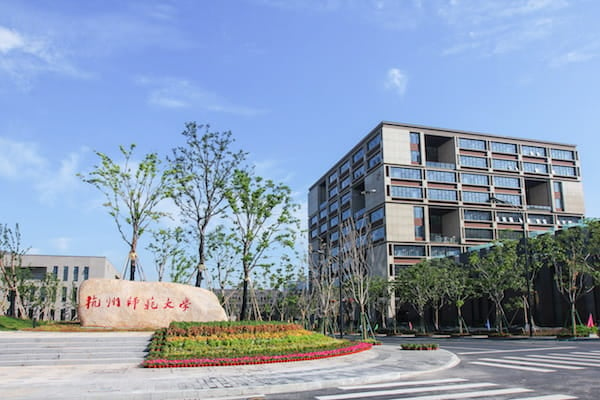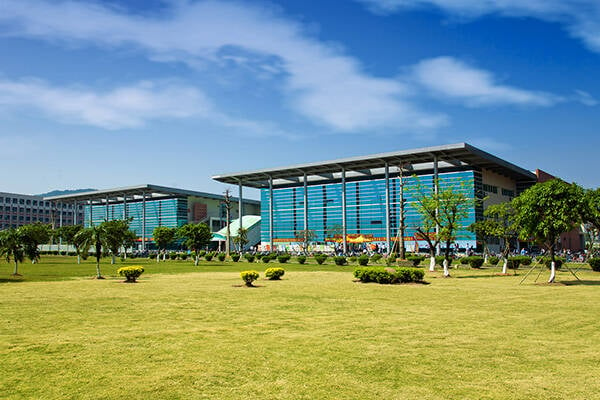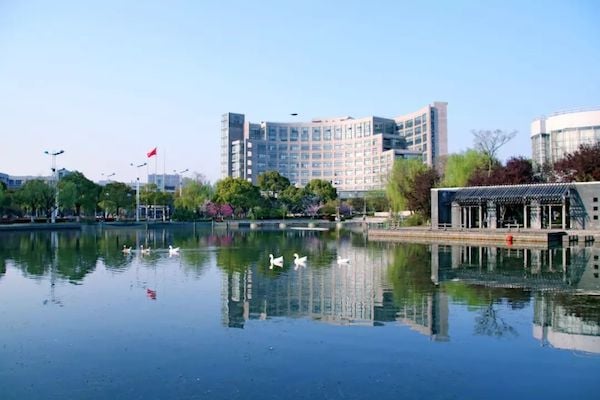Guangzhou Modern Information Engineering College
 |
 |
Introduction to Guangzhou Modern Information Engineering College
Guangzhou Modern Information Engineering College (广州现代信息工程职业技术学院, website) is a full-time general college officially approved by the People’s Government of Guangdong Province in 2005 and officially registered by the Ministry of Education. In 2010, it passed the Guangdong Province Department of Education’s talent training quality assessment. It is the Guangzhou Information Engineering Professional Continuing Education Base and the Guangzhou Innovation and Entrepreneurship Incubation Demonstration Base officially approved by the Guangzhou Municipal Human Resources and Social Security Bureau. The college is located in the central area of strategic development in the east of Guangzhou, and a high-tech industry demonstration base-Science City, with convenient transportation and elegant environment.
According to data from a joint survey conducted by the Guangdong Provincial Department of Education and a third-party evaluation agency, McCos, the basic working ability levels of graduates of 2012 vocational colleges in Guangdong Core knowledge level, our college graduates ranked first in both indicators.
Guangzhou Modern Information Engineering College establishes the school mission of “serving for local economic development, based on Guangzhou, serving the Pearl River Delta, and facing the whole province”, and establishes the talent training of “capability-based, employment-oriented, school-enterprise integration, and work-study integration”. The model aims at “cultivating high-quality skilled professionals in the production, construction, management, and service frontlines” as the ultimate goal, exploring the innovation and reform of the school-running model, and striving to create characteristics.
Guangzhou Modern Information Engineering College focuses on engineering, and has a coordinated development of literature, economics, management, and art. There are four branches: “Information Engineering College”, “School of Mechatronics and Automation”, “School of Architecture and Art”, “School of Economics and Management”, and “Basic Department” and “Ministry of Ideology and Politics”. 37 professional directions including information security and management, IoT application technology, mechatronics (intelligent manufacturing technology), drone application technology, industrial robot technology, urban rail transit and operation management, engineering cost, cross-border e-commerce, etc. It has trained a large number of talents for the economic development of the Pearl River Delta.
The school has 82 professional supporting campus experiments, practical experiments including network technology, information security, computer application technology, drone application, industrial robotics technology, e-commerce, digital animation design, environmental art studio, multimedia technology, clothing and apparel, etc. Training room; Academy and Xinbao Electric Co., Ltd., Guangzhou Haige Communication Intelligence Co., Ltd. (military industry enterprise), LG Lejin Display (China) Co., Ltd., Huizhou Huaxing Optoelectronics Co., Ltd., Xugong Group, Xinke Education Group, Midea Group , Guazi Automobile Service Co., Ltd., Xinke Education Group, Kejie Logistics Group, Guangzhou New Idea Education Technology Co., Ltd., Guangzhou Shenghua Information Co., Ltd., Guangzhou Wendou Network Technology Co., Ltd., Zhijia Group, Guangzhou Wendao Digital Information Technology Co., Ltd., Guangzhou Yongquan Investment Management Co., Ltd., Blue Moon International Group Co., Ltd., Guangzhou Suifeng Construction Engineering Supervision Co., Ltd., Woodpecker House Technology Co., Ltd., Tianhu Internet Design Co., Ltd. (Guangzhou Company), Guangzhou Three Decoration Design Project Co., Ltd., Guangdong Houji Education Department Co., Ltd., Guangzhou Tengke, Guangzhou Yuezhe, Guangzhou Roaming Company, etc. More than 600 enterprises and institutions in the Pearl River Delta region have established a production-education integration teaching system, implemented order-based training, and established a number of industry-oriented teaching and learning in the school. Learning and doing integrated school-enterprise cooperation training centers have also established nearly a thousand off-campus internship bases in Dongguan, Panyu, Zhongshan and other places, providing students with the opportunity to combine work and study and post internships and broad employment channels.
Guangzhou Modern Information Engineering College attaches great importance to the construction of full-time faculty, and strives to build a “double-teacher structure” teaching team with a reasonable structure, a combination of professional and concurrent, and relatively stability. In accordance with the teacher team construction plan, actively train and introduce professional leaders, and focus on the training and improvement of young and middle-aged key teachers. Through teaching practice, professional practice and business training, the school has more than 480 full-time dual-teacher and dual-teacher teachers with high morals, high teaching standards, and strong professional skills.
In recent years, the college ’s talent training has achieved a historic breakthrough: the “Computer Application Technology Training Base” has become the central financial support training base for higher vocational education, and has received 4 million yuan in funding from the central finance. This will greatly improve the quality of talent training and practical teaching in our college.
The college strives to build a new curriculum system that meets the characteristics of vocational education and cultivates high-quality skilled personnel. Implement a “double certificate” system that places equal emphasis on academic credentials and vocational skills qualification certificates to strengthen the cultivation of graduates’ vocational skills. The overall employment rate in 2016 was 98.92%, the overall employment rate in 2017 was 99.14%, and the overall employment rate in 2018 was 99.73%. In 2018, the employment rate of our graduates ranked sixth in the province’s similar institutions.
In order to cultivate talents who are in line with international standards, Guangzhou Modern Information Engineering College has also carried out various forms of cooperation and exchanges with foreign universities such as Singapore, New Zealand, the United States, the United Kingdom, Australia, and Malaysia, and has established further education, graduates, and junior colleges for students. Shengshuo Bridge.
Teaching Program
![]() ISAC University Teaching Program
ISAC University Teaching Program
Related Universities




